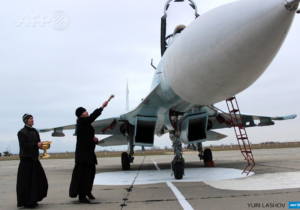Over the past few months, the Assad regime has launched a series of relentless offensives against the internationally recognized de-escalation zones in Syria. One by one, the de-escalation zones have fallen to his forces and hundreds of thousands of Syrians have been displaced. With nowhere left to go, they have been sent to Idlib province, where the situation grows more desperate by the day. Meanwhile, US officials, including John Bolton, have made statements that show America’s openness to a grand bargain with Russia that would supposedly curb Iran’s influence in Syria, allow Assad to remain in place, and give his regime a free hand to crush his enemies. These statements indicate an appalling misunderstanding of the situation in Syria. Such a deal would not be a masterpiece of realpolitik but rather a strategic catastrophe for the United States. It would inevitably lead to the mass exile or massacre of hundreds of thousands of civilians stuck in the international community’s failed de-escalation zone of Idlib and inevitably cement Iran’s control over Syria.
Bashar al-Assad’s inevitable attack on Idlib will follow an all too familiar strategy of creating desolation and calling it peace. Mass civilian casualties and the intentional displacement of the local population have become the calling card of regime forces. Assad has repeatedly and indiscriminately bombed targets from the air while regime forces, backed by Iranian militias, do the butcher’s work on the ground. These tactics have been largely responsible for over half a million deaths and the displacement of 12 million, including 5-6 million Syrians who find themselves in foreign lands.
It is therefore odd that key figures in the US and allied governments would say that Russia can be a partner in curbing Iran’s influence in Syria and that Assad’s allies will police themselves after the US recognizes his regime as legitimate. Iranian-backed militias make up the majority of Assad’s forces in Syria, supporting the mere two combat-worthy Syrian divisions Assad has at his disposal. How would Russia make up for the lack of manpower should it forcefully drive these militias from Syria? Would it be willing to send thousands of its own soldiers to help hold the recaptured ground? The answer is obviously no. Assad can hardly afford to lose the manpower and material support Iran provides. For instance, Iran continues to make large investments in reconstruction efforts and supports religious-ideological campaigns, such as Shia proselytizing aimed at converting the remaining Sunnis and other efforts to resettle Shiites from Lebanon, Afghanistan, and Iraq on Syrian lands that Sunnis once owned. It is irrational to believe that Moscow possesses any sufficient leverage to interfere with the growing ties between Damascus and Tehran.
While diplomatic discussions continue, the White House announced on August 17, 2018, that it would cut funding for stabilization efforts. This includes support for democracy and civil society activists and programs meant to counter extremist activities in Idlib province. Soon after the administration’s announcement, European allies also cut their funding for stabilization efforts. This is a major mistake as it only empowers the extremists in Idlib who now are the only ones with the resources the populace desperately needs. Indeed, humanitarian organizations are warning of a catastrophic crisis because of a regime offensive. The Syrians in Idlib have nowhere left to go, as Turkey has closed its borders and refuse to accept any more refugees. The players are set for a horrific showdown.
The regime’s bloody drive forward will displace millions, pushing more and more people toward the border with Turkey. And when the regime reaches the hundreds of thousands desperately stuck between its meatgrinder and the impenetrable borders, the moment all fear and know is coming will have arrived. It will either be another mass exodus to a foreign country, or they will be gunned down in full view of the international community, watching safely from the other side of the border. Assad has not shown mercy yet, and having walked miles over the gassed, dismembered, tortured, and mutilated bodies of his own people to get to this point, he is unlikely to do so now.
What is the world to make of the silence and lack of action as Assad slaughters yet more of his people, as the Russians break yet another agreement, as Iranians inch yet closer to total regional hegemony? In June, the United States issued threats against the Assad regime, saying there would be consequences if it violated the de-escalation zones, but then told the rebels in Darra they should not expect help when the offensive came. These failures to enforce our foreign policy redlines will carry consequences. Winston Churchill, observing Neville Chamberlain return triumphantly from Munich remarked, “Britain and France had to choose between war and dishonor. They chose dishonor. They will have war.” Actions must follow words.
The international community cannot rely upon Russia to police Assad or his allies. The problem continues to be Assad, who remains the obstacle to the creation of a just and lasting peace in Syria. It was Assad who stifled his people’s civil rights and inflamed the ethic and religious divisions that blew his country apart in 2011. Egregiously, he cynically used religious minorities, such as Syrian Christians, for propaganda purposes to convince the West that he was the protector of religious minorities. While claiming to be their protector, he was responsible for the targeting of 63 percent of Christian churches destroyed in Syria. The same cynical sectarianism and authoritarianism that destroyed Syria is not the solution to the crisis.
The United States must force Assad, Iran, and Russia to adhere to their own de-escalation zones. To put pressure on the regime, the United States should appoint a US envoy to Geneva to reinvigorate the peace process as soon as possible. Secondly, the Treasury Department should immediately impose sanctions on all Iranian-backed militias that are doing the regime’s bidding in Syria and denounce attacks on hospitals and other civilian targets by the regime and its backers. Also, should Russians and their allies continue to violate the de-escalation zones, more arms and training should be supplied to Ukraine as a strategic counterweight to Russian meddling in the Middle East. If those in the international community who supported the Syrian revolution are not willing to defend the merger scraps they agreed upon, their adversaries will believe themselves capable of getting away with more in the future.
The United States must not surrender its reputation or strategic position in exchange for vague promises that Russia has no interest or power to actually carry out. And the longer the US continues to indulge in flights of fantasy, the closer we get to the bloody end or more mass displacement of those suffering in Idlib. What shall the world say about our honor? What shall our enemies say about our desire to protect our national interests? They will once again say too much was said and too little done until it was too late.
—
Justin Roy holds a Masters in history from the University of San Diego with an emphasis on Middle Eastern history.
Photo Credit: Makeshift artillery in Aleppo, December 2016. By Russian military, via Wikimedia Commons.






